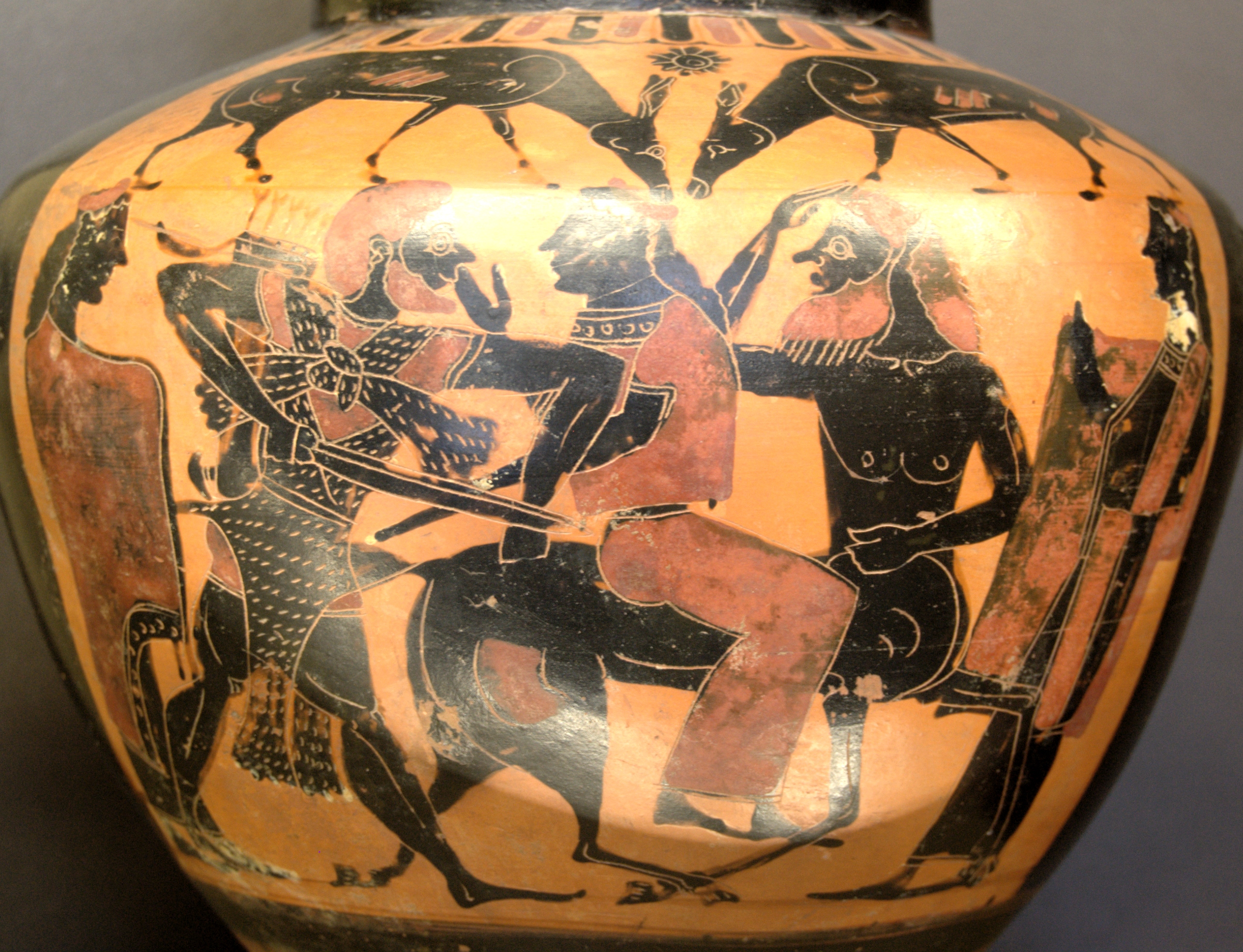|
Nessos
In Greek mythology, Nessus ( grc, Νέσσος, Nessos) was a famous centaur who was killed by Heracles, and whose poisoned blood in turn killed Heracles. He was the son of Centauros. He fought in the battle with the Lapiths and became a ferryman on the river Euenos. Mythology Nessus is known for his role in the story of the Tunic of Nessus. After carrying Deianeira, the wife of Heracles, across the river, he attempted to have intercourse with her. Heracles saw this from across the river and shot a Hydra-poisoned arrow into Nessus's breast. As he lay dying, as a final act of malice, Nessus told Deianeira that his blood would ensure that Heracles would be true to her forever, knowing the blood to be infected with the hydra's poison. Deianeira foolishly believed him. Later, when her trust began to wane because of Iole, she spread the centaur's blood on a robe and gave it to her husband. Heracles went to a gathering of heroes, where his passion got the better of him. Meanwhile ... [...More Info...] [...Related Items...] OR: [Wikipedia] [Google] [Baidu] |
Shirt Of Nessus
In Greek mythology, the Shirt of Nessus, Tunic of Nessus, Nessus-robe, or Nessus' shirt was the poisoned shirt that killed Heracles. It was once a popular reference in literature. In folkloristics, it is considered an instance of the "poison dress" motif. Mythology Fearing that Heracles had taken a new lover in Iole, his wife Deianeira gives him the "shirt" (actually a chiton), which was stained with the blood of the centaur Nessus. She had been tricked by the dying Nessus into believing it would serve as a potion to ensure her husband's faithfulness. In fact, it contained the venom of the Lernaean Hydra with which Heracles had poisoned the arrow he used to kill Nessus. When Heracles puts it on, the Hydra's venom begins to cook him alive, and to escape this unbearable pain he builds a funeral pyre and throws himself on it. Metaphorically, it represents "a source of misfortune from which there is no escape; a fatal present; anything that wounds the susceptibilities" or a "destr ... [...More Info...] [...Related Items...] OR: [Wikipedia] [Google] [Baidu] |
Deianeira
Deianira, Deïanira, or Deianeira (; Ancient Greek: Δηϊάνειρα, ''Dēiáneira'', or , ''Dēáneira'', ), also known as Dejanira, is a Calydonian princess in Greek mythology whose name translates as "man-destroyer" or "destroyer of her husband". She was the wife of Heracles and, in late Classical accounts, his unwitting murderer, killing him with the poisoned Shirt of Nessus. She is the main character in Sophocles' play ''Women of Trachis''. Family Deianira was the daughter of Althaea and her husband Oeneus (whose name means "wine-man"), the king of Calydon (after the wine-god gave the king the vine to cultivate), and the half-sister of Meleager. Her other siblings were Toxeus, Clymenus, Periphas, Agelaus (or Ageleus), Thyreus (or Phereus or Pheres), Gorge, Eurymede and Melanippe. In some accounts, Deianira was the daughter of King Dexamenus of Olenus and thus, sister to Eurypylus, Theronice and Theraephone. Others called this daughter of Dexamenus as Mnesimache ... [...More Info...] [...Related Items...] OR: [Wikipedia] [Google] [Baidu] |
Hercules Nessus MAN Napoli Inv9001
Hercules (, ) is the Roman equivalent of the Greek divine hero Heracles, son of Jupiter and the mortal Alcmena. In classical mythology, Hercules is famous for his strength and for his numerous far-ranging adventures. The Romans adapted the Greek hero's iconography and myths for their literature and art under the name ''Hercules''. In later Western art and literature and in popular culture, ''Hercules'' is more commonly used than ''Heracles'' as the name of the hero. Hercules is a multifaceted figure with contradictory characteristics, which enabled later artists and writers to pick and choose how to represent him. This article provides an introduction to representations of Hercules in the later tradition. Mythology Birth and early life In Roman mythology, although Hercules was seen as the champion of the weak and a great protector, his personal problems started at birth. Juno sent two witches to prevent the birth, but they were tricked by one of Alcmene's servants and sent ... [...More Info...] [...Related Items...] OR: [Wikipedia] [Google] [Baidu] |


